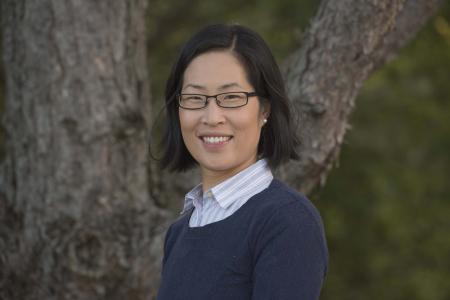Judy Cha Wins Moore Foundation's Investigator Award

For her work in exploring new and better quantum materials, Judy Cha, the Carol and Douglas Melamed Associate Professor of Mechanical Engineering & Materials Science, has received the Moore EPiQS Materials Synthesis Investigator Award.
 With the five-year $1.7 million research grant, Cha aims to increase the precision of nanomaterial synthesis for quantum materials, which have unique properties that fall outside of classical or semiclassical theory, such as unusual electron behaviors. More specifically, Cha wants to create quantum materials at the nanoscale that are free of defects, have morphologies and dimensions that are easy to control, can be scaled for practical uses, and can be integrated with other quantum materials.
With the five-year $1.7 million research grant, Cha aims to increase the precision of nanomaterial synthesis for quantum materials, which have unique properties that fall outside of classical or semiclassical theory, such as unusual electron behaviors. More specifically, Cha wants to create quantum materials at the nanoscale that are free of defects, have morphologies and dimensions that are easy to control, can be scaled for practical uses, and can be integrated with other quantum materials.
It’s an ambitious goal, but her lab is in a good position to take it on. Cha pioneered the synthesis of topological nanomaterials - that is, materials that act like conductors only on their surfaces and as insulators in their interiors. Using a growth method known as chemical vapor deposition, her lab was the first to achieve superconductivity in nanowires made from tin telluride (SnTe), a topological crystalline insulator. The significance of making nanowires is that certain things happen in nanosized materials that don’t in those of conventional sizes - and that could lead to harnessing some of the coveted properties that researchers are looking for in quantum materials.
“For topological quantum computing, we know we want them to have superconductivity, to operate at certain temperatures, and to have a current we can amp up to some critical level,” she said.
The field of quantum materials is still in its earliest stages and practical applications for these kinds of materials are numerous. For example, they could potentially lead to a magnetic resonance imaging (MRI) machine that operates without liquid helium or liquid nitrogen, or a superconducting magnet that operators could pump in more current to induce a much higher magnetic field.
“It all depends on how you engineer materials,” Cha said. “It’s about knowing the ingredients and the knobs that I need to tune for my materials, and that means we need to understand how these materials are synthesized and the methods for doing so - how do we control these conditions to make better materials and get better control?”
Cha credits her progress in this field in part to the support and access to key shared facilities she gets working in the Energy Sciences Institute (ESI) at Yale’s West Campus. Because of their potential use in quantum computers - anticipated to be far more powerful than conventional computing systems - Yale has identified the development of quantum materials as a priority research area.
A breakthrough in quantum materials could also help stave off the predicted end of Moore’s Law - that is, the idea that the number of transistors on a chip will double about every two years (named for Gordon Moore, founder of the organization behind Cha’s grant). As it is now, however, the copper used in today’s electronics has shrunk down so much that its resistance has increased and essentially reached its limit. A topological metal - a quantum material - could potentially solve that, since resistance would be low regardless of how small the copper is.
This is the second time that the Gordon and Betty Moore Foundation has awarded the grant. It was first awarded in 2014 through its Emergent Phenomena in Quantum Systems (EPiQS) Initiative, a $185-million funding program whose goal is to accelerate progress in the field of quantum materials. The Gordon and Betty Moore Foundation helps fund scientific discoveres as well as work in environmental conservation, patient care improvements and preservation of the Bay Area.

